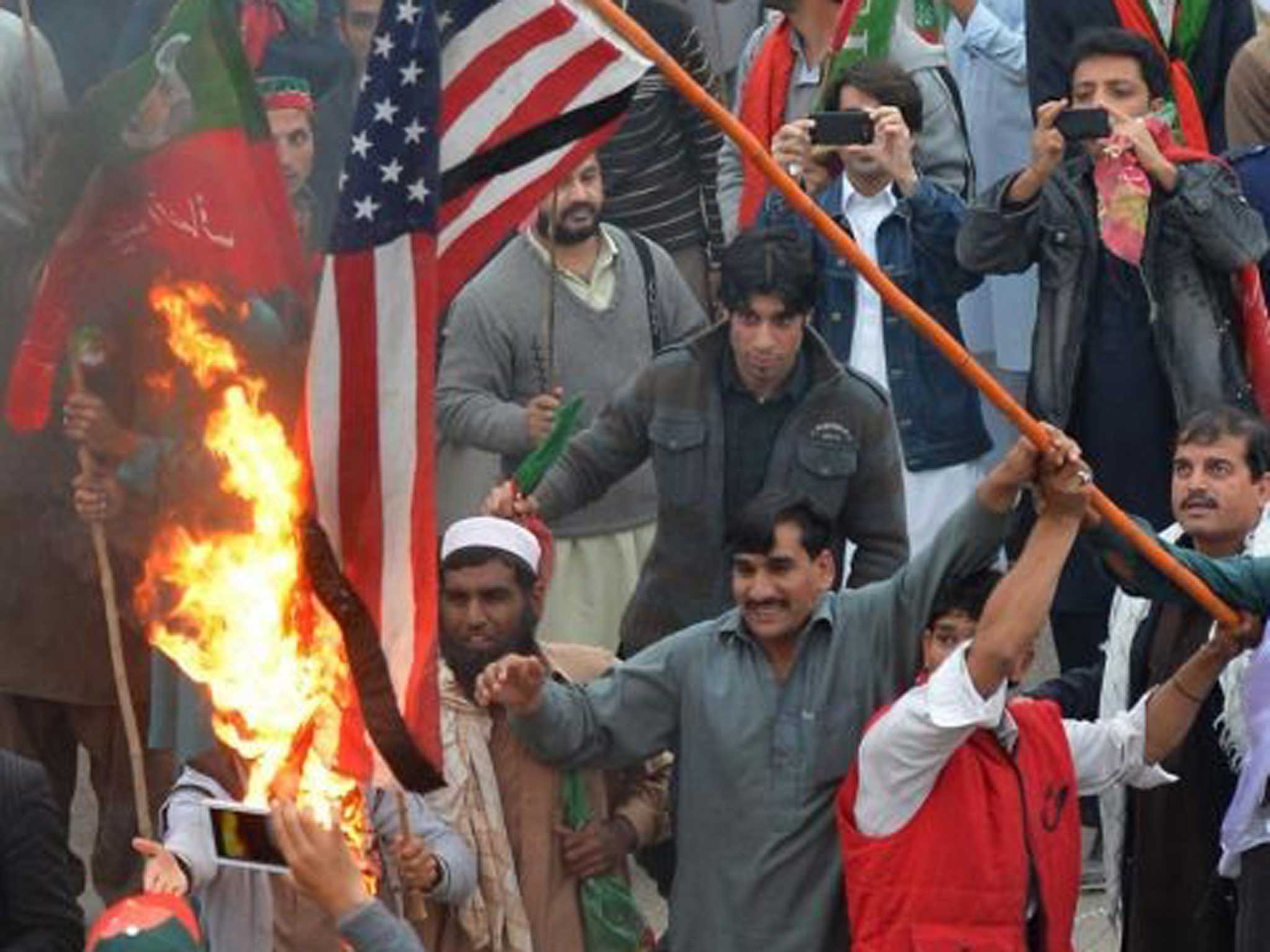Cricketer turned politician Imran Khan leads anti-drone protesters in blockade of key Nato supply line
Thousands rally in Peshawar, amid fears the CIA will aim unmanned anti-Taliban strikes deeper into Pakistani territory

They came to Peshawar in their thousands from regions across Pakistan, united by a shared opposition to CIA drone strikes that are claimed to have killed innocent men, women and children. And yesterday, led by the cricketer turned politician Imran Khan, protesters began a blockage of a key Nato supply route.
To the thumping soundtrack of Pakistani pop, played from large speakers mounted on the back of trucks, some 7,000 to 10,000 protesters gathered along a two-lane road near where the Grand Trunk Road begins. The road runs from Kabul, Afghanistan, to Calcutta, India, and is a key Nato supply line for troops across the region.
“Until drone strikes are stopped, we won’t stop our protest,” Mr Khan told the enthusiastic crowd, who were waving the red and green flags of his party, which runs the north-west Khyber Pakhtunkhwa government. The party has led a furious chorus of opposition to the CIA’s recent drone strikes which Mr Khan claims have derailed attempts to negotiate with the Pakistani Taliban.
Earlier this month, the Pakistani Taliban leader Hakimullah Mehsud was killed by a drone strike at his compound in North Waziristan. And last week, a senior leader of the Haqqani network was killed in a rare strike in Hangu district, an area outside Pakistan’s tribal areas.
“We were going towards peace,” Mr Khan bellowed. “The Taliban was ready to negotiate with a political government for the first time. The drone didn’t just kill Hakimullah Mehsud, it killed our peace process.” Mehsud had been a brutal leader of the Pakistani Taliban since 2009. Under his command, the militant group had slain hundreds of Pakistani soldiers and launched near-daily suicide bombings.
Mr Khan’s stance has been backed by the federal government in Islamabad, with Interior Minister Nisar Ali Khan leading a heightened pitch of anti-Americanism. But the government has stopped short of lending its support to Mr Khan’s attempt to halt Nato supplies.
Critics of Mr Khan accuse him of being soft on the Taliban, reacting furiously to drone strikes but remaining insistent on negotiations with the militants even as they continue to mount terrorist attacks.
Mr Khan, his critics say, only reacts to CIA drone strikes, but has not led protests against the Taliban and other militant groups’ bombings in Khyber-Pakhtunkhwa province since his party came to power there.
Meanwhile, news of another drone strike in Hangu district on Thursday triggered particular anger. It was only the second such strike outside the tribal areas along the border, sparking fears that the CIA may fire drones deeper into Pakistani territory.
The Hangu drone strike targeted a compound belonging to the Haqqani network, a group of Afghan insurgents that is seen by the US as its most potent enemy in Afghanistan, responsible for devastating attacks on US troops and the US Embassy in Kabul.
Saeedullah Khan, 40, an activist from Mr Khan’s party who travelled from Lower Dir to join the protest, said: “This drone strike was an attack on us, on our provincial government. It was an attack on our territory, not the tribal areas. Who knows where the next drone will strike?”
The vast majority of the mostly young and almost exclusively male protesters had come from other parts of the north-west, but party members from afar as Lahore, Islamabad and southern Punjab augmented their ranks. Mir Faraz, a 24-year-old student, said he had travelled from Miranshah in the North Waziristan tribal area along the Afghan border, said. “We want peace in North Waziristan. That’s why I am here.”
Mr Faraz said that he and other natives of North Waziristan are wearied by the constant buzzing of drones in their areas and the destruction they wreak. “They kill some Taliban, but they also kill innocent people,” he added. “I have seen them strike houses and cars.”
The debate over the CIA’s use of drones has been heightened by reports from Amnesty International and UN rapporteurs that have said that more civilians are killed than the US publicly acknowledges. Amnesty accused the CIA of being responsible for “war crimes” just last month.
Mr Khan has said that the blockade will endure until drones stop. “We will have protests across the country until America stops its drones,” he boomed from the stage yesterday. But it is unclear how long the activists will be able to sustain the protests. After the speeches, the crowds swiftly began to thin, abandoning the rows of chairs that had been laid out.
But some activists remained confident of their chances. Muhammad Asghar Jan, a 30-year-old software engineer from Islamabad, said: “We will stay here for as long as it takes.”
Another, Adnan Malik, also 30, said it was up to Mr Khan. “Whatever Khan says, we’ll just close our eyes and follow.”
Subscribe to Independent Premium to bookmark this article
Want to bookmark your favourite articles and stories to read or reference later? Start your Independent Premium subscription today.

Join our commenting forum
Join thought-provoking conversations, follow other Independent readers and see their replies